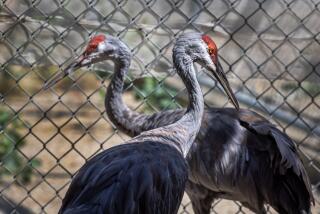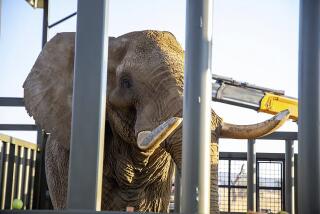Beasts From China May Prove to Be a Burden for the Kabul Zoo
- Share via
BEIJING — Two lions, two bears, a wolf and about a dozen other wild animals are preparing to journey to Afghanistan as a Chinese safari park plays Noah to the war-ravaged country’s ark.
The well-intended gesture, however, has provoked an outcry from international animal rights advocates, who argue that the Kabul Zoo in the Afghan capital is in no condition to accommodate these furry peace ambassadors.
“To send these animals to Kabul now flies in the face of everything the Chinese government has done for conservation,” said John Walsh, international project director for the London-based World Society for the Protection of Animals. “It’s not fair to the animals. It will subject them to a lifetime of cruelty and suffering.”
The Chinese donors say that their government has stayed out of the effort and that their decision to send the creatures was based on assurances from Kabul that they will be adequately cared for.
“Foreigners overemphasize the material conditions,” said Yi Feng, a manager at Beijing’s Badaling Safari Animal World, which is supplying the animals. “It may not be as nice as it is here, but these animals are spiritual symbols of life and bravery. They mean a lot to the Afghan people.”
Inspiration for the gift came from the death in January of Marjan, the grenade-blinded lion who had become a symbol of Afghanistan’s suffering.
“We didn’t even have to think,” Yi said. “We just wanted to send them a replacement lion.”
Decades of war have left the Kabul Zoo with more stuffed animals than live ones. Most of the latter were either killed by bombs or eaten by fighters of the Taliban, the hard-line Islamic regime that the U.S. helped depose last fall.
The offer from China was too good to refuse. In fact, Kabul responded with a wish list of 22 animals, including some deer, blue peacocks and wild pigs.
“We are totally against the notion that we can’t care for these animals,” said Abdul Basir Hotak, the consul general of the Afghan Embassy in the Chinese capital. “The Kabul Zoo is ready to receive animals. We are very optimistic about lasting peace, and the Afghan people are very determined to rehabilitate and reconstruct everything.”
That may well be the case down the road, critics say, but sending wild animals now is premature. The zoo is still struggling with basic infrastructure issues such as water, electricity, food and medical supplies.
Animal lovers the world over have donated an estimated half a million dollars to help restore the Kabul Zoo, according to Walsh. But the money is earmarked for the care of existing animals and for turning the zoo into a center for conservation education. A flood of new animals from China would overwhelm the system and do the creatures more harm than good, he contended.
“Most of the zoo was destroyed. The buildings that are left are concrete and iron bars, which is not the modern zoo concept today,” said Walsh, who was in Afghanistan early this year helping to rebuild the facilities. “If the lions get into a fight, there isn’t even a vet there to tranquilize them in order to treat them.
“I can’t understand why the Chinese government doesn’t take notice of what the professionals around the world are telling them.”
Neither the Badaling park nor its partner, the China Wildlife Conservation Assn., a nongovernmental organization, has sent its own staff to inspect the Kabul Zoo. Although they know about the general resistance to the plan, they claim to be in the dark about specific evidence that their animals could be harmed.
“It’s not that we are not open to international opinion, it’s that we haven’t heard any,” said Zhao Shengli, the project director at the conservation association.
Meanwhile, the enlisted Chinese animals have already been put in quarantine pending a direct flight to Kabul this month. But Zhao said his group would consider postponing the move if it learned that the Kabul Zoo isn’t safe.
Chinese critics are also questioning the timing and wisdom of the donation.
“If we want to help Afghanistan, we could give them something else,” said Mang Ping, a researcher with Friends of Nature, a Beijing-based environmental nonprofit group. “But an animal is a living thing. Unless you can absolutely guarantee their safety, we really shouldn’t do it.”
Wang Shuan has mixed feelings about the gift. The 24-year-old zookeeper bottle-fed the pair of 3-year-old Kabul-bound lions. After their mother abandoned them, Wang fed the cubs every two hours for 12 hours a day until they could eat meat.
Wang and other zookeepers named the male cub Zhuang Zhuang, Chinese for “Strong Strong,” because he was a weak baby. They called the lioness Kai Ni, after another caretaker’s daughter.
“In the beginning, I was very sad,” said Wang, who said the park has been inundated with visitor queries about the logic of sending animals to Afghanistan.
“Now it’s become such a big deal. They will serve as symbols of the friendship between our two countries,” she said.
“But I wish I could push their departure date back, until conditions there improve.”
*
Times staff writer Ni was recently on assignment in Beijing.
More to Read
Sign up for Essential California
The most important California stories and recommendations in your inbox every morning.
You may occasionally receive promotional content from the Los Angeles Times.










